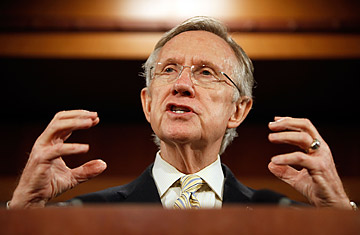
Senate majority leader Harry Reid
After a weekend of intense consultations with fellow Democrats, Senate majority leader Harry Reid has decided he has the votes to get a health-reform bill with a public option to the Senate floor. "I believe we clearly will have the support of my caucus to move to this bill and start legislating," Reid declared at a news conference Monday afternoon. The real question, however, is whether he has the votes it will take to get it out of the chamber.
The bill that Reid intends to introduce would include a public option with a so-called "opt-out" provision, giving states the ability to decide not to offer a small share of their residents the chance to buy into a government-run health-insurance alternative. Ostensibly, such a provision would appeal to moderates, who object to the public option as giving the government too big a role in health care. But in practice, it is difficult to see why any state would actually make the decision to opt out, considering that no one would be forced to buy into the public option, and it would not cost states any additional money. Reid offered few details as to how the opt-out mechanism would work.
Indeed, the real significance of his move is tactical. Both procedural hurdles ahead of Reid — bringing up the bill and cutting off a promised Republican filibuster — will require him to muster every one of the 60 Democrats in his caucus. But the motion to proceed is far easier for the Democrats; to block their leader on that would be a gratuitous slight. What is questionable is whether they will vote with him when the time comes to cut off a filibuster, a procedural move that is known as invoking cloture. At this point, it appears that Reid could be three votes short, with most of the focus centering on Senators Blanche Lincoln of Arkansas, Mary Landrieu of Louisiana and Ben Nelson of Nebraska. All three come from states that John McCain carried handily against Barack Obama in 2008, and Lincoln faces what could be an uphill battle for re-election next year.
Reid himself also faces what could be a difficult re-election in 2010, which could be one of the factors driving him in favor of giving the public option a shot on the Senate floor. "This is all about his home-state politics," said one senior Democratic Senate aide. "This gets the left off his back." If he can't manage to get the public option past a filibuster, Reid could at least tell the liberals in his party that he gave it his best effort.
Recent weeks, however, have also seen some subtle shifts in the politics surrounding the debate over whether the health-care legislation should include a public option. A new round of polls show that it continues to enjoy broad public support, and the industry's efforts to fight the bill may have backfired politically. Additionally, there are new horror stories of people being denied coverage on unfair pretexts, and reports that insurers are jacking up the rates for small business in advance of the legislation. Meanwhile, the Congressional Budget Office recently determined that a public option could save a significant amount of money, particularly if its payments to providers are tied to Medicare's reimbursement rates, as House Speaker Nancy Pelosi would prefer. That, however, would likely bring strong opposition from doctors, hospitals and other health-care providers, who complain that they are underpaid by Medicare, as well as many moderate Democrats.
Meanwhile, the White House Monday sought to tamp down reports that it has misgivings about Reid's plan to bring a public option to the floor, which may well cause the only Republican who might vote for reform, Maine Senator Olympia Snowe, to vote with her party. Presidential press secretary Robert Gibbs issued a statement declaring that President Obama is 'pleased that the Senate has decided to include a public option for health coverage, in this case with an allowance for states to opt out. As he said to Congress and the nation in September, he supports the public option because it has the potential to play an essential role in holding insurance companies accountable through choice and competition."Initially, the public option was a relatively small feature of the health-reform design, meant primarily to assure that there would be some competition for private insurers. As President Obama noted in his September speech before Congress, no more than 5% of Americans — largely those who are now uninsured — are expected to sign up for it. But the public option has assumed an outsized political significance, thanks to the fact that it has become a flash point between the left and the right. That is in part because both see it as a potential precursor to a government-run single payer system, similar to those of Canada and some European countries.
